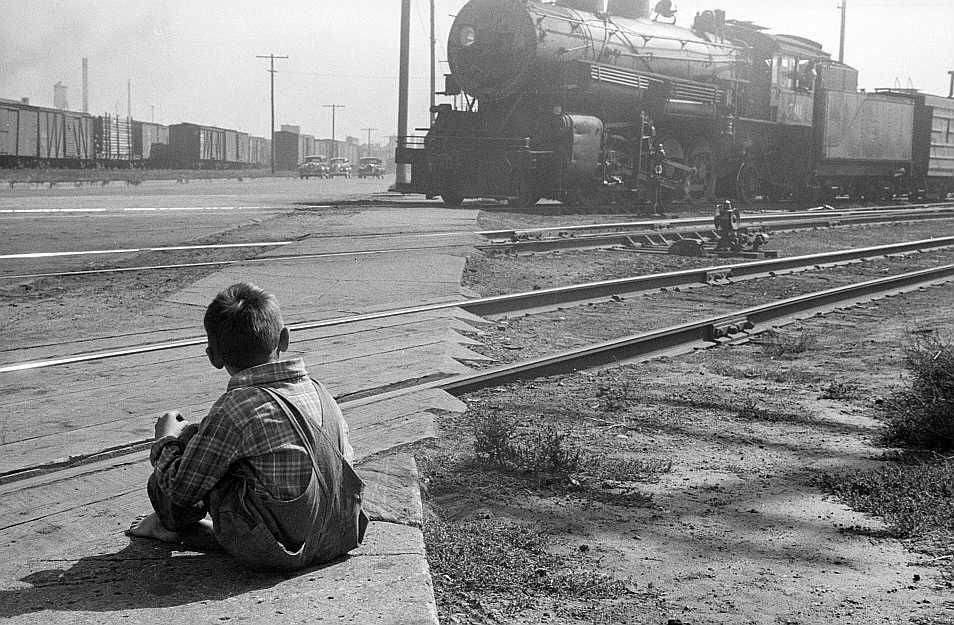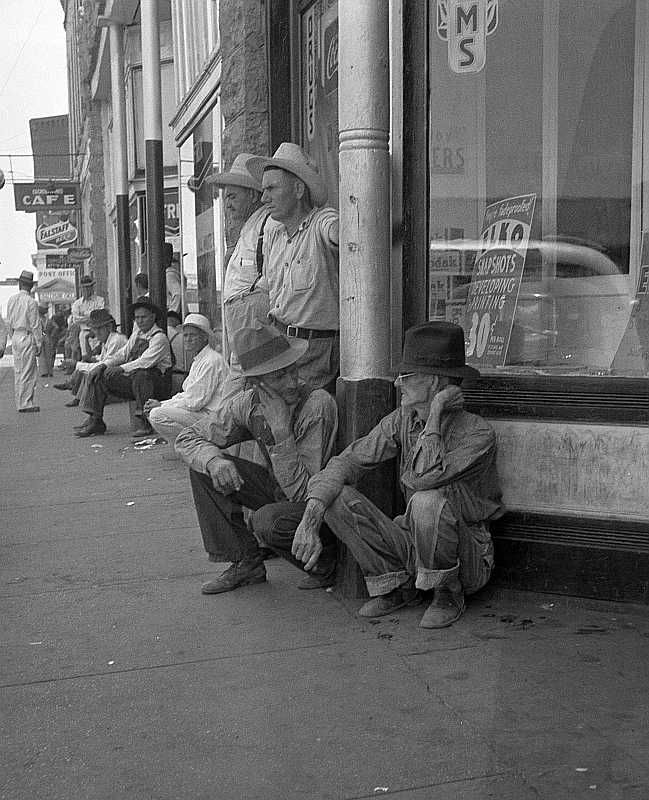
OKLAHOMA
Bill Lawrence
In 1938, I was 24. I had gone to Mack, Colorado to help my brother on an irrigated farm. When the crop was gathered, I headed back to Oklahoma.
Rode the freights home.
“As we got higher into the mountains and into the night hours it started snowing and getting colder by the minute. The snow that stuck to the floor had gotten 6 or 8 inches deep when we started into a long tunnel.
The smoke from, the engine made me keep getting lower until I was flat on my belly breathing through a crack in the floor and the heat from the engine melted all the snow and was cooking on my back when we came out of the tunnel and into the blizzard again. The train pulled onto a siding to let another train pass. A brakie made me get into an empty boxcar to keep me from freezing.
The only ones in there were a boy and girl about 15 or 16 years old. They were lying on a small pile of sawdust and covered up with a thin blanket. About 3 a.m., he was trying to get her up[ but all she would do was cry and beg him to let her lay still. When he let her lay down, she stopped crying instantly.
I knew she was freezing to death. I went up to them and told her that if he didn’t get her warmed up she would be dead shortly.
I folded the blanket and we rolled her in it so that all that was sticking out was her head, arms and feet. Then I put my heavy coat on her with the hood over her head. Then he got on one side and I got on the other.
We shuck and drug her around until she finally started walking some. Then we took turns until she stopped crying and started complaining about being cold. Then we rolled her in the blanket head and foot. He lay down beside her; I lay down on the other side.
We slept until the train stopped at Trinidad, Colorado about daylight. I tried to get them to get off and have breakfast with me but they were afraid of losing their ride. So I wished them good luck and we parted.
OKLAHOMA
Charles R Doty
18/1942
I quit an oil field job in Oklahoma to see the world, chase women, get in the movies.
If I did apply for a job and someone else was applying too, I would leave and tell the boss the other guy needed the job more than I did for several reasons. I knew when I got a paycheck, I would probably quit anyway and there was a look of desperation on so many people’s eyes who were trying to get a job. I did without several meals but I am still alive and kicking.
Asked hustlers in pool halls and prostitutes in hotels for help. Mother always said if you get down and out and need help go to the hustling class of people for help because they will always help you since money to them is easy come, easy go. She was right.

OKLAHOMA
Dale Elmore, 19
Being very young and very shy I was too bashful to ask for food. Others must have sensed this because they always shared what they had with me.
Remember one particularly cold night a group of older black men moved back from a fire so that I could warm myself I did not have a coat. I was very cold and only had a sweater.
OKLAHOMA
Gerald Johnston
In several towns, a detention center was set up to catch any of the hoboes that might be strong enough to place on the county or city labor gangs.
Many of these gangs were forced to work in filthy or dirty conditions, sewer cleaning, farm work where the barns had to be cleaned out. Very little food was furnished and no extra clothing
The Depression was brought to the front due to the failure of the banks. However, about this time of the summer of 1936, another booger stuck his head up to create other problems: The grasshopper.
Those of you that have never seen a grasshopper plague have missed something. The hoppers were huge, some over six inches in length, others smaller. When a wave landed they ate everything in sight, then hopped or flew to another location. The hoppers that landed on the trees would eat everything and leave the tree without any green part showing.
I had a field of sorghum Higera that was about ready to harvest and the hoppers left the stalk, the stems of the big leaves and nothing more that was of any value..
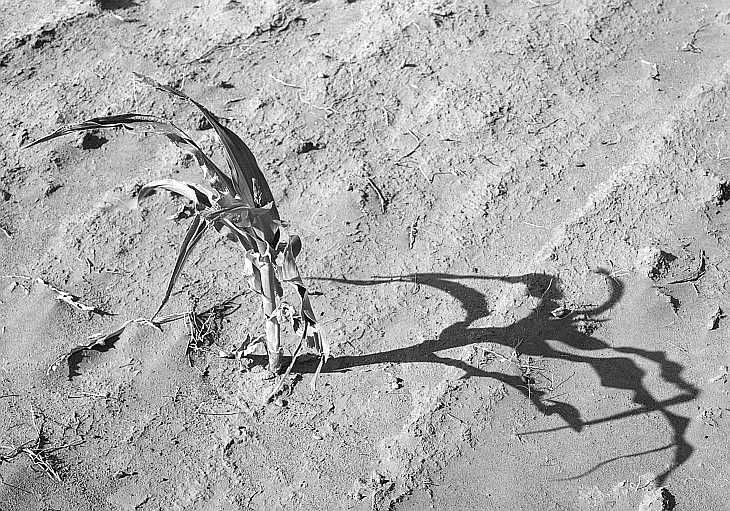
OKLAHOMA
Harold Harris
I was born in 1923 in a one-room shack, about six miles west of Shattuck, Oklahoma. I suppose we were the poorest family in this part of the country.
After living on nine sharecropper farms in 12 years finally moved to town in 1937. Pop was finished off from working any more from stroke; mom worked in a laundry for $1.25 a day and made five deliveries a day. Dad had worked for the WPA before stroke…
Dust storm: I believe it was on a Sunday in 1936. My two brothers and I had been over to the neighbors across the pasture about one mile to the northeast. We saw the dust rolling in from the northwest. I believe it is still in the newspapers every now and then.
The dust rolled in from the northwest to southeast kinda slow like, always before when dust storms came in, you could always see a short distance, but this time it was very different. It made one great big roll from northwest to southeast, and before the second roll got to us, it was like standing in the mouth of a huge cave, and looking to the southeast, about a mile to the southeast, was the top of the large cave.
And then the next roll and you couldn’t see your hand in front of you. I tried, put my hands up in front of my eyes, and couldn’t see them. We talked it over, two brothers and I and decided we had better hold hands. I was 12, two brothers 13 and 14, so that we couldn’t get lost; had never been this way before but thought we could find our way home. We crossed fence, barbed wire, and in about 15 to 20 minutes we could begin to see our hands.
Retired when I was 67. Never asked for any handout and still don’t want any. I don’t live in the best house in my town called Nickles Hills, but it is the most exclusive area in Oklahoma City. Been here about three years, and the neighbors are now starting to speak to us. I guess when you’ve been real poor, it will always show.
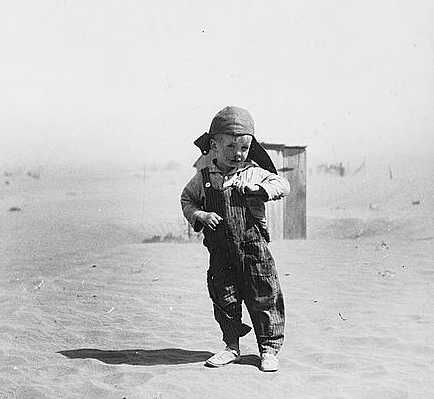
OKLAHOMA
Hazel Rowley Kohut
Father and his twin brother rode rails.
“There were several men inside the boxcar, including one very large sour-looking man and next to him a very small quiet man. The train rounded a curve throwing the small man against the larger man. He shoved the small man and said, “Watch it punk!” The little man very softly and politely said, “I’m sorry, sir."
Pretty soon the same thing happened again. This time the larger man shoved even harder sending the little man across the car against the wall.
It happened so fast, no one saw where it came from, but the little man had a gun and shot the large, mean man dead.
He then turned the gun on the rest of the men in the boxcar and told them to line up against the far wall and don’t move. He then took the dead man’s wallet and tags on his clothes and threw them out the door. He told the men he would be getting out the next stop but they were to stay on until the following stop. This they did.
My father and uncle believed that the man that did the shooting was a woman.
I remember my father telling the story when I was a little girl.
OKLAHOMA
Hugh Marshal Thomas
24-26, 1930-1932
One time a railroad bull was coming after them with a six shooter, but after he saw their bloody feet, he softened and told them which train to catch.
They stopped and asked a man for food. He was real gruff and said they didn’t have any. Dad asked if they could stop and change the rags on their feet. (Pillow ticking to help ease the blisters) The fellow said yes and after seeing their bleeding, blistered feet went into the house and came back with big plates of food plus money to give them.
Once in Enid, OK, it was freezing cold with no place to stay, so they started whooping and hollering down the streets of town, hoping to get arrested so they’d have a warm place to sleep. It was so cold the local gentry did not want to come out either, for nothing happened.
OKLAHOMA
L.W. “Red” Barber
I was born on old Route 66 in 1918, 5 miles east of Clinton, Oklahoma. I attended first grade at Red Rock one room school
I am proud to be an Okie. That’s what a man in Flagstaff on 66 called me. I thought he was mistaken that I was another man he knew as Okie. He said he knew, he saw my tag, and now I know I am an Okie.
Late '35, Salt Lake City, our freight had the intersection blocked. About 8 that morning, this young boy aged 11 asked for a lift up, through our box car we thought, the safest way to cross to the other side to get to school.
He was still with us when we got off in Sacramento, CA.
I saw steel for the West Coast bridges shift forward and pin and kill hoboes.
Dry thirsty hike on the Santa Fe freight. The steam, engine stopped every hour or two to take on water. The local people would sell you a glass of water for 10c. It was durn worth it.
A hobo would work for his grub. I’ve cleaned out chicken houses for a sandwich and chopped and hoed weeds out of cotton fields for 75 cents to $1 a day.
I got an appendix attack between Clovis, New Mexico and Amarillo. Couple of hobo men made a pack saddle holding their hands together and sat me there to take up the shocks. At Amarillo, I found a grain elevator and crawled in it to sleep it off.
One time we got some Irish potatoes, peeled them and ate them: that gave us water and nourishment for couple of days. Several days after that we again needed to eat. We ate the dry potato peelings and survived.
You used a shoestring and tied your hat to a suspender so it wouldn’t be blown off. If you had old worn socks you pulled them over your shoes to keep from scuffing and tearing up in the box cars floors when you were dozing and the train stopped very quickly. We used to keep goggles on: without them your eyes would get cinders in them.
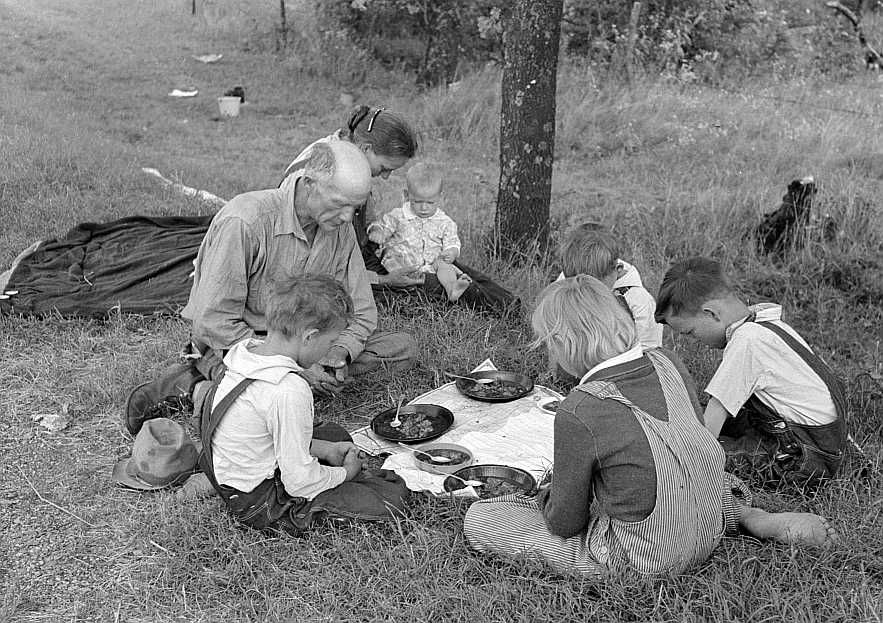
OKLAHOMA
Ray Hinkle
1932
In Polk County, Missouri land sold for two dollars and acre. Milk cows sold for twenty dollars. Mature hogs sold for six dollars. The Depression continued on.
I was born in Goodson, Missouri. My mother passed from this life at age 18. I was 3 months at time. By the time I was six, both parents had passed away.
I was now a boy of 15. I stood six feet in height. One morning instead of going to school I walked to highway 65.
A youthful brawny hobo was walking along the track in my direction. He was a jubilant lad about my age. As he walked along, he was singing and I immediately recognized the song. It was a song Jimmie Rodgers had recorded in the late 1920’s.
The song title was “Waiting For A Train.” The lad was doing a magnificent job singing.
All around a water tank
Just waiting for a train,
A thousand miles away from home
Just waiting in the rain.
I walked up to a brakeman
Just to give him a line of talk
He said if you’ve got money
I’ll see that you don’t walk.
My pocketbook is empty
Not a penny can I show,
Get off, get off, you railroad bum
He slammed the boxcar door
He put me off in Texas
A State I dearly love
With wide open spaces around me
The moon and stars above
No one seems to want me
Or give me a helping hand
A thousand miles away from homeI’m going back to Dixie land.
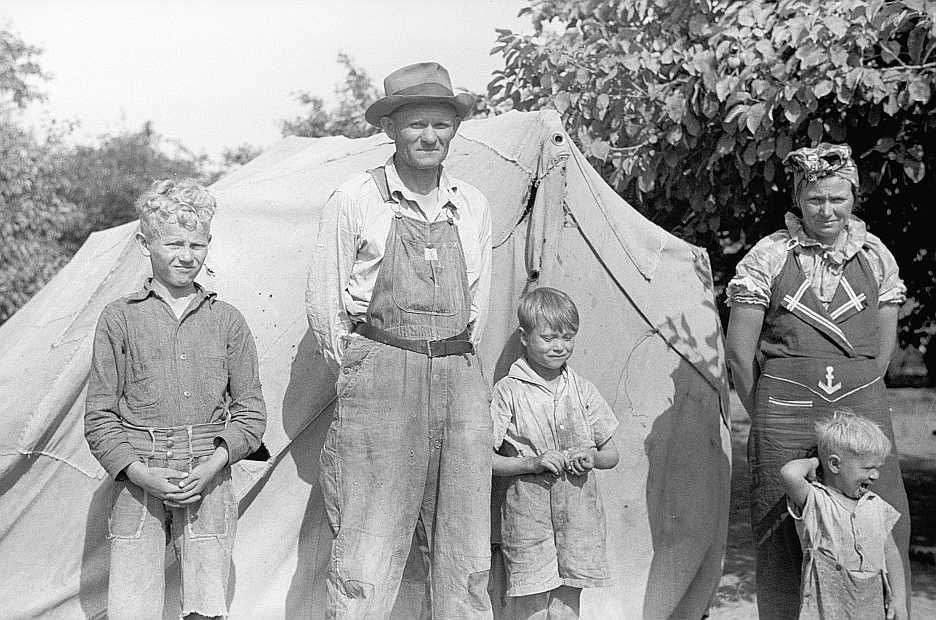
Through human instinct during my early years I learned to be defiant. I considered other people and I tried to be a considerate person. I always tried to help the less fortunate man, who had been trampled on by society. I have begged food and then divided with decrepit tramps who were too weak to beg and were on their last journey through life.
I learned from experience the necessary tactics when a fight erupted to be able to protect myself in any manner I deemed proper.
I have at times threatened men who were attempting to rob a down-and-out tramp of his few pennies. These men usually retreated when I suggested they move on. I did not invite trouble. Neither did I back away from trouble. All I was interested in, was that a man be treated like he was a human being.
I have seen and heard men whine because they thought the world owed them something. I have seen weaklings cry because they were destitute and lonely. I have seen degenerates and perverts whom society closed their doors on. I have seen fake traitors and crawlers who intentionally wept as people approached them in order to beg money in their sad plight.
I’ve seen girls who were once considered respectable, walking the streets, offering their bodies for a paltry fifty cents. I have seen drunkards in tattered clothing passed out in alleys. Tomorrow was another day.
On Commercial Street, Springfield (Missouri) I was accosted by a prostitute. She was standing at the bottom of the stairway, which was the entrance to a shabby hotel, located upstairs.
"Would you like to spend a dollar with me?" she asked as she looked me over with anticipation.
"Wait until I run down to the bank and swing a loan." I grinned.
"You really that broke?"
"I'm so broke I've got flat feet."
"Well good luck to you," she stated as I walked away.
I was standing on a street corner, trying to analyze my next move. Two men approached me. By the way one of them was dressed, I immediately recognized him as a man of the cloth. I was promised a free meal if I would attend church services that evening at City Mission.
Since my strength had dwindled, I insisted the good man take me to a restaurant for some food before I agreed to attend City Mission that evening.
The man of the cloth agreed to my terms. We walked to a restaurant not far away. I was instructed to order anything listed on the menu. Being a hungry vagabond I accepted his hospitality and soon devoured a full meal. As agreed, I followed the two men to City Mission. The good man of the cloth suggested I sit on the front row. I did not think this was really necessary, but if this made the man happy, I would grant his request.
There were a dozen men loitering inside the Mission. No women were present. The environment would have been contrary to their approval.
The man of the cloth entered the pulpit and stood behind a crudely constructed podium. His eyes wandered from man to man.
"Some of you men have never been here before. I will introduce myself to you. I am Brother John. I welcome you to City Mission. Jesus loves you and I do too. I am here to help you anyway I can. No matter how far down in the gutter of sin you have been, Jesus still loves you. He is the best friend you ever had."
One of Brother John's followers in the rear of the Mission yelled out:
"Preach it Brother John. Preach it." A stack of tattered song books were passed out by Brother John.
"I can't sing and I can't read." An old drifter told Brother John.
“That’s all right brother, Jesus loves you just the same.”
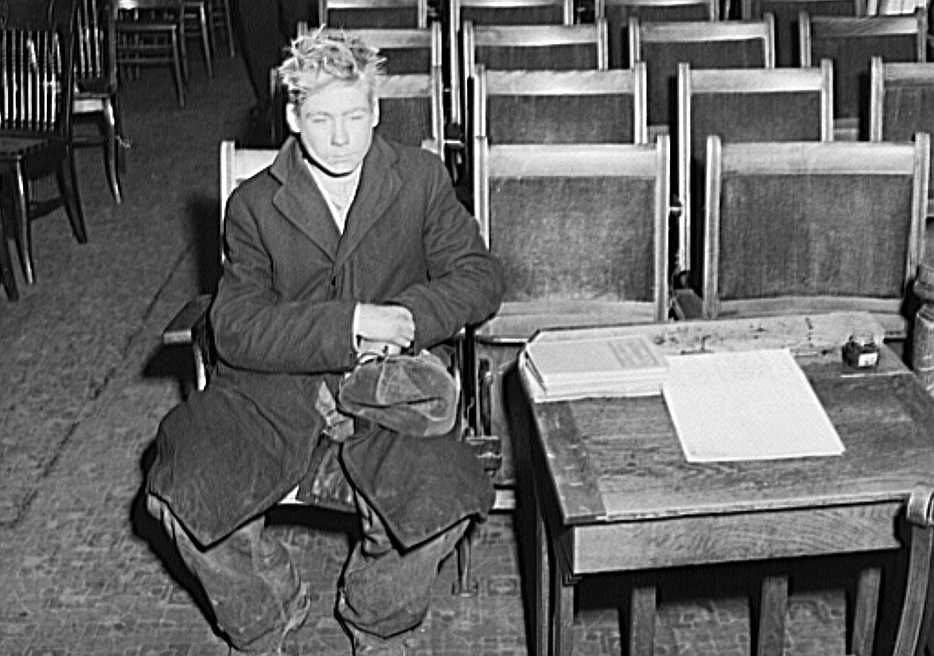
One Saturday afternoon, as we were walking back to our living quarters after attending a ten cent movie, this happy vagabond told me a story about a youth who had the misfortune of losing his life while riding a train. In later years I often thought of this tragedy. Here is the story as it was relayed to me:
"Me and a boy by the name of Menefee were riding a freight out of Houston, Texas. It was a cold and windy night. We were riding on the roof of a box car. About fifty miles north of Houston, the rain begin to come down in sheets.
It was raining so hard you couldn't see your hand if you held it up. We were both soaked to the skin. Menefee said he was going over the end of the box car and try holding onto the ladder which was located between the cars. In this fashion he thought he could escape some of the rain.
Just as Menefee reached the end of the car, the slack on the train ran out, causing him to lose his balance.
I crawled to the end of the box car very carefully. The rain practically blinded me. I managed to look down from the box car but was unable to locate Menefee. I knew it was curtains for him. Later, I heard that Menefee's body was found and he was cut up in such a condition that his remains were picked up in a bushel basket.
"The railroad held an investigation concerning Menefee. In the final analysis the conclusion was that Menefee was on or near the end of the box car. The train had started down an incline at a high rate of speed. In order to slow the train, it was necessary for the engineer to set the brakes. The slack ran in and Menefee lost his balance, which resulted in his death.
“Even now as I view the passing years, the shadows of time begin to close around me. In precious memories I still belong to a part of those years and will continue to do so until I reach that last sunset. The open road was part of my life. The roads I traveled will continue to be a reality in my dreams of yesterday. They will be part of me until the rover has wandered the last road home.
I would not take a million dollars for the experience I gained from being a road kid and hopping freight trains, no matter where they were going. But at age 75, you finally see the curtain begin to drop. The eagle that wandered off in its youth has returned to the valley."
OREGON
A.J. Fox
“We were coming to Ashcroft and I noticed the train wasn’t slowing down when all of a sudden behind me I saw canvas from a packsack come flying up between the cars.
I thought My God it must be George.
At about that time the engineer must have seen it too because he threw on the brakes and stopped the train.
I jumped off and ran back. I saw something beside the tracks, it nearly made me sick: George’s hands and head laying there.
He apparently fell across the rails when he tried to get aboard. The sight haunted me for months as when I looked at his head, his eyes were still open and seemed to recognize me. The wheels going over his head must have sealed some blood and oxygen in his brain, sure was terrible.
The sympathetic cops were sure something. They said "let that be a lesson to you people. Now maybe you will hit the road."
OREGON
Bertha Schultz
My husband, John Stahl, had been on the road from Michigan to the west coast from the age of 16.
In 1938 I joined him. We were married in 1934 and now had two young boys. The boys stayed with grandparents, while we hopped the rails, slept on trains, station platforms. Worked as hired hands and cook at many ranches.
Saginaw, Michigan, Idaho, Montana, Oregon, we saw a lot for our young years.
My husband was killed in May 1939 at Hammond, Ind in a freight yard. He was coming back to Michigan. He was either hit in the back of the head or was riding a load of rails and the load shifted.
I was left to raise two boys on $8 a week working in a restaurant.
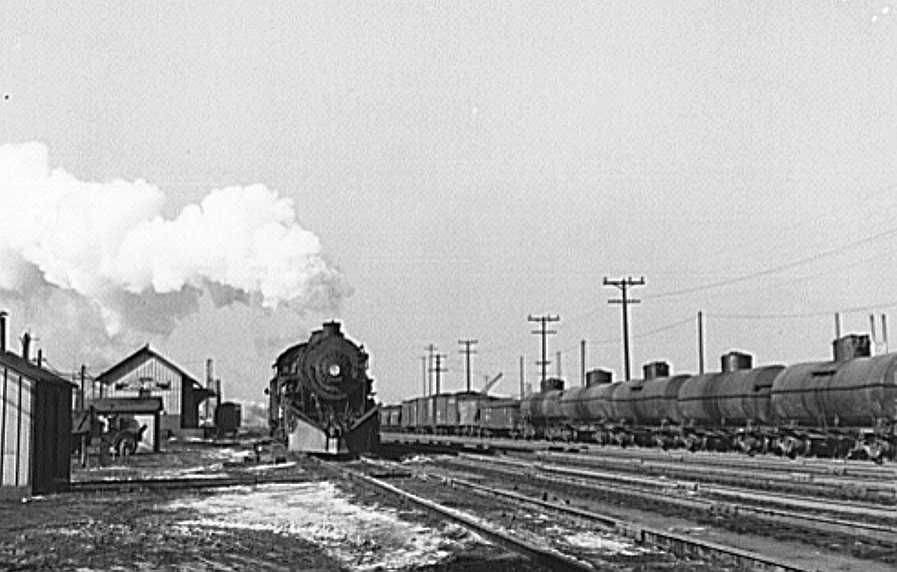
OREGON
Bill Padrick
1932
Left Portland ORE at age of 18 to see Chicago World’s Fair with $5.
“Most of the trainmen helped me along the way. At Ogden, Utah a girl was put in the same boxcar with me. He told me to respect and take care of her and that he would see that I did. He put in a bale of straw for us against the cold of the mountains.
All the way along they saw to it that we had food and rest stops between trains. The word to care for us was passed down along the line to each crew with the one exception being Cheyenne, WYO. It was a mean place as far as railroad bulls were concerned. We had to leave the train and walk around the town and catch them as they picked up speed.
At Council Bluffs we were put in the cab of a passenger engine. This train caught water on the fly at high speed from a trough between the tracks. I can compare sound most closely to jet engine close to you.
When we neared the station in Chicago the engineer stopped the train to let us off so that the yard bulls did not get us. We went our separate ways in the city.”
OREGON
David Conner and Jack Koyle
Teenagesr, summer of 1939
Rode the rails to Portland seeking work, but couldn’t get job. Headed back home to La Grande, Oregon.
“They first got on a flat car loaded with piles of lumber, then made their way to the empty ice compartments of a reefer car. They soon found that to be unbearable, and during the night while the train was stopped, they found a box car where the door had been opened only a few inches, and wired (with a lead seal) in that position.
They removed the wire and the seal and entered the car, to find a big Holstein bull fenced off in one end, and a pile of hay in the other. They soon made good use of the hay, and slept well the rest of the night.
Early in the morning Dave found a drum of water, a bucket, a pitchfork, and fed and watered the bull. He noticed a copy of a shipping document tacked to the fence confining the bull, and learned that this animal was "King Rex" who was on his way from Medford, Oregon to Boise, Idaho.
Later that morning they found the door opposite to the one they had entered was not fastened in any way, so they pushed it open, and sat with their legs dangling out to view the Washington side of the Columbia River Gorge as they passed Cascade Locks.
The train slowed, and was just inching along when it stopped, they were surprised by a railroad employee who said he had been ordered to feed and water the bull in that car and wanted to know what they were doing there.
Dave said: “We are here to take care of old King Rex. We got on with him in Medford, and were hired to take him to Boise". The man looked at some papers on a clipboard he was carrying along with a lunch box and said "Well, somebody got the orders crossed up".
He went on to say "It looks like you boys haven't had any breakfast. I didn't eat mine last night, so have some coffee, and keep the sandwiches." He said he lived near-by and after chatting a bit wished them a good trip to Boise, and left.
The rest of the trip to La Grande was "First Class" with Jack and Dave enjoying all the comfort of the hay and all the freedom they thought they had when they boarded the train at Reith. The expedition had been a financial failure, but was an adventure of a life time for two kids from Eastern Oregon.
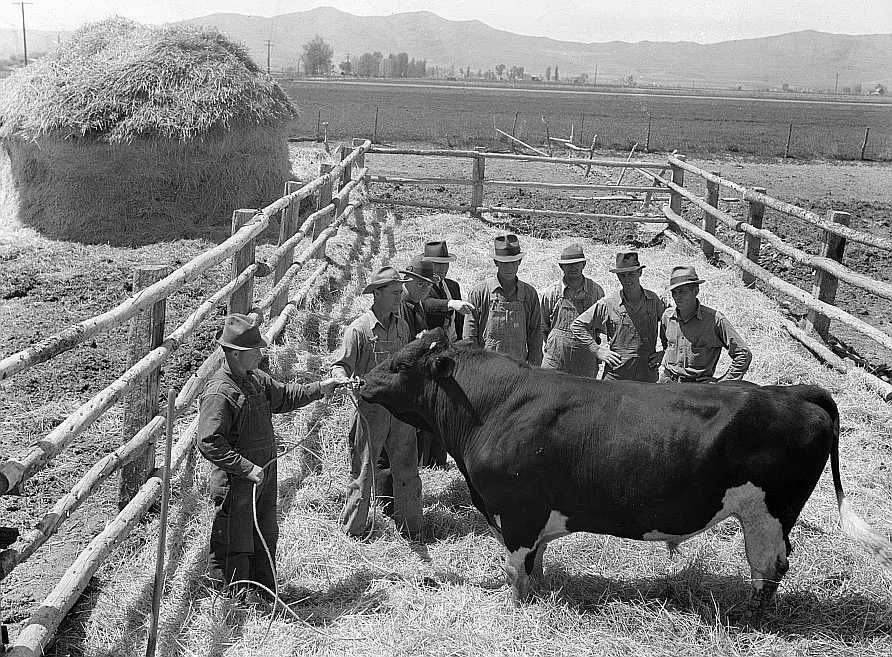
OREGON
Dobbie Stadt
18-year-old working in Miami as waitress 1935; end of tourist season wondered where to find work? Heard about World’s Fair in San Fransisco and set out across country.
"In Kentucky I remember two young fellows who took us up into the hills so that their mother could give us a good lunch. After they were sure we weren’t “revenuers,” they took us further into the hills to see their family still.
“When I think of what this world has become it amazes me that never once that entire trip did anyone try to take advantage of us.”
Helped by trainmen: “As the men came out of the building they had a most startled look to see two young girls dressed in skirts and blouses climb out of the freight car.
We were pretty shabby looking by now as we hadn’t washed for days. They took us into their office building and offered us a shower. We were a bit hesitant but one of the older men said he would stand guard at the shower room door and no one would bother us. They gave us towels and boy what a treat it was to stand under a warm shower again.
When the train was ready to pull out they helped us back on board the same car we had climbed out of, handed us a sack of food and wished us well.
Car was loaded with black iron pipe laid lengthwise. We climbed up on the top row and once again were on our way.
After two days of sitting on top of that black pipe in scorching hot weather crossing the desert we were a couple of burned gals.”
Sign along the RR warned of the consequences of picking fruit.
OREGON
Earl Shervey
Born 1925
Age 3, family moved to coal mine five miles from Columbus Ohio.
My father worked in the mine and family lived in the mine camp. That’s where we were when the Crash of 1929 came. It was during the Dustbowl and grasshopper infestation. During the summer months our parents would find jobs for my brothers and me on a local farm.
At the age of 10, I was working for a widowed woman. My job was to herd the cows, help with the milking and any other chores she had. My pay was room and board and 25 cents a week.
1937 Dad tried to organize a union and was fired. Got work with WPA.
1940 I was 15 and went to Oregon to look for work. It was nearing the end of the Depression but lots of men of all ages were still going out west to look for work.
OREGON
Elmo Spencer
In the 1930's, the severe mid-western drought turned farm land into "The Great Dust Bowl" at the same time the whole country was suffering under "The Great Depression".
Many farm families and others in communities relying on agriculture were forced to leave their homes and look for a means of surviving elsewhere. Residents of the small town of Guide Rock beside the Republican River in southern Nebraska were among those who were forced to look for new opportunities to make their living.
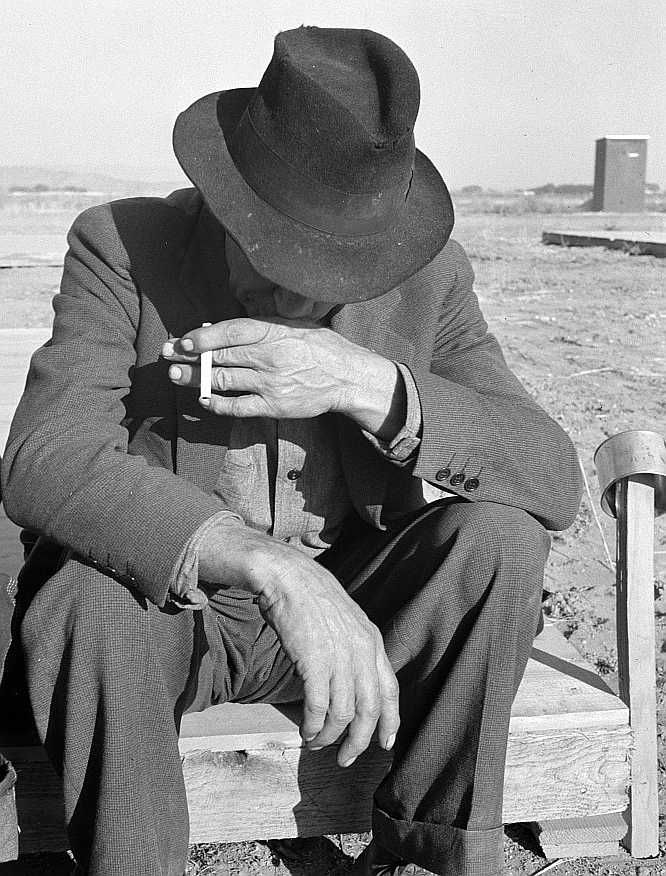
My cousin Elmo Spencer and his friend Lowell Shuck, then high school boys, "rode the rails" together, looking for any kind of work. They were sleeping in the brush between freight train rides when Elmo wakened to hear two other wanderers talking about people being hired in Oregon to pick fruit and to work in the canneries.
So Elmo woke his friend to tell him they were on their way to get a job in Oregon. Without money, the trip was not an easy one. Elmo has told of going into restaurants and asking for a glass of water. When the waitress was turned away, he upended the catsup bottle over his water glass as a substitute for food he could not buy.
The boys went to Hillsboro, Oregon and found the jobs they had hoped for. They slept under the cannery steps at night, and survived on fruit until they got their first pay check.
They went back to Guide Rock to finish high school, and during the school year, the principal, C. J. Rosenau, had serious discussions with the boys about the Oregon opportunities. Mr. Rosenau eventually took his family to Oregon, as did many other Guide Rock residents.
Not all worked in the canneries, but those who did, found that when the fruit season was slack, unemployment checks were available, something unheard of in the Midwest. The newcomers were able to make a new start and over the years have prospered in their new homes.
Courage and determination in the face of hardships did not disappear with the pioneers, and young people and others have led to new frontiers in every generation, and will continue to do so.
The former Guide Rock residents did not forget their ties with home, and every year, they met in the park in Hillsboro for their annual reunion.
I witnessed the people coming out of the Dustbowl and the terrible wind and storms. Things were so dry that everything just blew away. A banker in my little town in South Central Nebraska crawled five blocks on his hands and knees to get home.
I learned that for a homeless children living dangerously the world could be cruel at times.
OREGON
Emery Cochran
Emery was born in Boone County, ARK in the Ozark mountains in 1912. These people were all poor but they had little farms where they grew beans, sweet potatoes, turnips, corn and sugar cane. They lived off the land, picked wild apples, plums, peaches, berries etc.
The hunting was good, lots of squirrels, oppossums, black birds and fish. Even skunk but it was used for rendering for colds and healing. When the Dustbowl started the animals and the fruit trees, even the fish were gone, so money had to be made somehow in order to live.
Emery knew the corn was ready to pick in Missouri so the only way he could get there was by freight train. He went all day on train without food or water. At a small town he was met by the local policeman who told him to get out of his town right now and get back to the freight yards.
Emery picked corn and made $1.00 day, good money then.
Another time going to look for work, he packed a suitcase and checked it for destination. Then he rode the blinds of the same passenger train. Arrived at his destination, jumped off and came around to the station and got his suitcase.
OREGON
Francie Potter
Graduated Los Angeles high school in 1931 and married four months. Difficult to find work. My husband’s job also folded. We did odd jobs until March 1932. We decided to go to a farm my uncle owned in Wayne, Missouri.
At Colton, CA we got onto a freight train, in the section called a “reefer."
The men working on the trains and in the train yards were known as yard bulls and they became very hardened to their jobs as they had been told to keep the people off the trains, but there were so many people riding the freight trains that it became an impossibility and tended to make many of the yard bulls mean.
I remember clearly a terrible nightmare ride out of a town called Big Springs, TX. The police had been instructed to pick up transients and put them to work picking cotton for practically nothing, so all of us went into hiding until the train got ready to pull out.
My husband and I were hiding under a culvert and as the train started to pull out we ran to the train grabbing anything we could to get onto the train. When we did, we saw all those people coming from behind trees, buildings, any place where a person could hide, it was truly a sight to see.
It was without doubt the jerkiest ride of the whole trip and when the train slowed down to cut off some cars, we were on one of those to be cut off, my husband had me jump down and keep running to the cars left behind us, keeping a light shining on the tracks.
I almost fell over a man that had been cut in half and lay between the tracks.
I screamed for my husband to turn the light off, but he said because of the accident the train would be held up and we could get into a boxcar.
We broke the seal on one and it was empty so many of us got in quietly shutting the door, no one talked until the train started again.
I feel to this day that the poor man’s death caused the yard bull or plain bulls to overlook one of the doors that had been opened, and it let a lot of people move on that night.
One had to be especially careful not to take anything off and lay it down, especially shoes or they would be missing when they woke up. Many were barefoot because of trying to give their feet a rest.
Some people called us bums, others knights of the road. I always looked on us as people out of work, no place to live, just trying to survive.
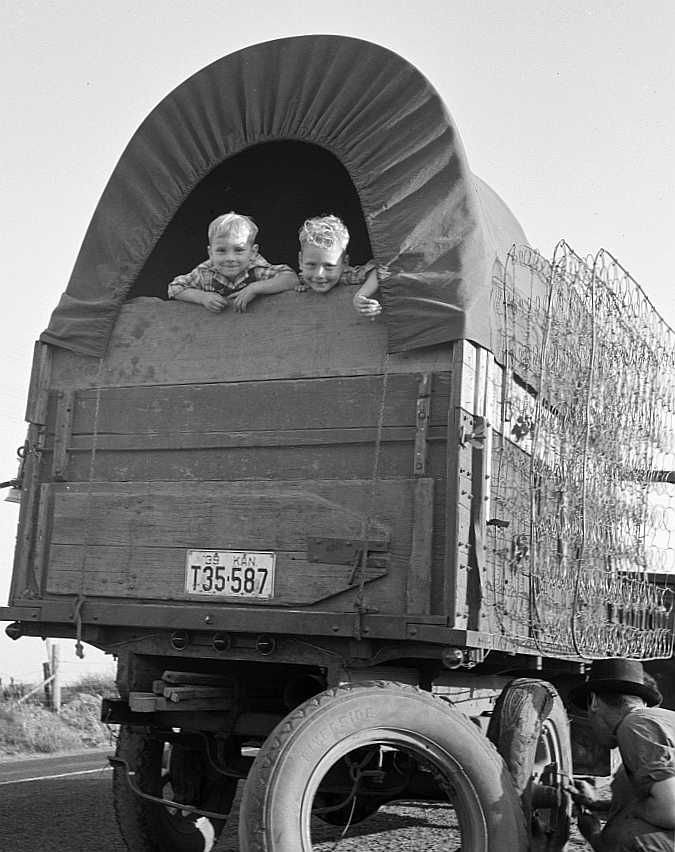
OREGON
Frank Tennyson
My adventure began about 6 in the evening about the first week of June. I hopped a Chicago and-Northwestern freight train and after three days ended up in Havre, Mòntana.
On the train I met numerous travelers who were heading West where rumors were that jobs were available. Havre, Montana was at that time a railroad junction.
All main railroad stops had their "jungles", a meeting place for social gatherings and an eating place for "hobos."
Typically you'd find a fire for warmth and cooking, buckets and cans and wooden blocks for chairs. We had been on that train for three days with very little to eat or drink so five of us "hobos" decided we would scour the town for some food and meet back at the jungle where we would prepare our feast.
Each of us was assigned certain items to obtain for our meal and the rules of the road forbid any questions of how things were acquired.
In about two hours four of us were back with an assortment of food items including bread, donuts, vegetables, fruit and other ingredients. The person who had set out to obtain the meat showed up about half an hour later with two live turkeys!
In the jungle was a 10 gallon oil drum that was used as a cooking pot. We prepared the turkeys and put them along with the vegetables in the pot. We cooked our stew for several hours and later that night had a feast which I remember to this day as the best stew I’d ever eaten. We not only had enough for our dinner but we were able to have a good meal the next morning.
Late evening at Yakima, WA, I hopped a freight going to Oregon. There were about 25 of us in a boxcar including six or seven females. It was late at night and very dark when we all heard a girl screaming for help in one end of the car.
Several of us rushed to see what was wrong and found a fellow trying to rape this young girl.
This was definitely against the rules of the road and myself and two others subdued the would-be rapist and bodily threw him out the door.
I never found out who the girl was or what happened to her attacker after he was thrown off the train.
At a rail junction in Montana, where the local had stopped on a bridge sidetrack to let a freight pass, being very young and foolhardy I decided to catch onto the freight as it went by us. I tied my pack on my back and I climbed out on the ladder then held on with one hand as the ladder on the other train was a good 2-3 feet from me.
I still shudder when I think of what could have happened if I had missed.
OREGON
Fred Schatz
"JOURNEY TO NOWHERE"
My chum and best friend Leo Eder and who was also my age, we spent a lot of time together during those depression years. Leo's folks lived right across the road from my folks. Both farm families trying to eke out a living during those trying times. There was no work to be found, and of course with out work there was no money. Even after the Government started work programs, these were only for married men with families.
There was a transit shelter established in town for homeless single men. Leo and I used to walk to town and stop in and listen to the men talk about their experiences traveling around the country. Some times we would walk out to the hobo jungle and sit around and listen to the stories the men would be telling each other. Thinking back now as I write this I guess it sounded like adventure to us.
Leo Elder and I, after many discussion, finally decided to go. We each packed a knapsack with a towel, a bar of soap, a razor, change of underwear and socks, and an extra shirt. Also a fork and a spoon and a pocket knife.
At that time there where four passenger trains a day going through Glidden. One came through in the morning about seven going North. Another went South about eight. Then about three in the afternoon another went North and went South again about seven in the evening. That’s the one we decided to take. When the train came in we where waiting in the bushes on the other side of the tracks from the depot. When it started we made a run for it and climbed up on the tender.
We rode as far as Prentice which is where the main line crosses the main line that runs from Sault St. Marie Michigan to Minneapolis Minnesota. We got of at Prentice and waited for the passenger train going to Minneapolis. There were seven or eight hobo's or lumberjacks, what ever you want to call them in the station. Some were sitting and some were lying on the benches sleeping. This station stayed open all night and they just left these men stay. After all this was the Great Depression
When the passenger train came in we got on the tender and rode it all the way into Minneapolis. The train made quite a long stop in St. Paul but no one bothered us. There where two other hobo's riding the tender with us also, bumming there way out West. We decided to spend a couple of days here. The fellows riding with us how to get to skid row, which in Minneapolis is in the area surrounding Hennepin Ave. and Nicolette Street.
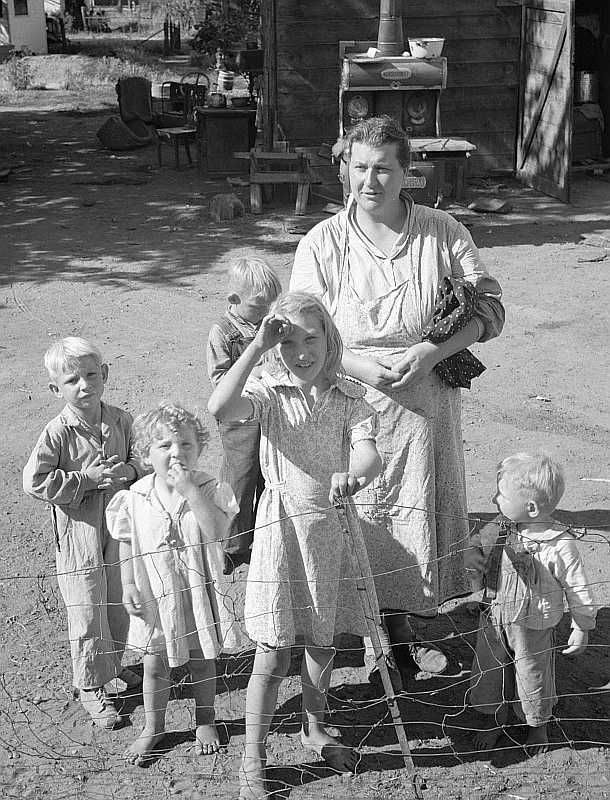
We stayed for a couple of days and than decided that the next morning we would continue West. The Great Northern railroad station was right on the edge of skid row, and the freight yards where right behind the station. Hobos had a nickname for the Great Northern they called it the Billy Goat line.
The reason being that the railroad ran through the edge of Glacier National park and on their box cars they had a logo of a large circle with a Billy Goat in the center and around the outside it said "The Glacier National Park line".
At that time there were three railroad lines going to the West coast on the Northern route. The Great Northern went to Seattle and the Northern Pacific and the Milwaukee Road ended at Seattle and also at Portland Oregon. The Great Northern was the closest for us to get to so that was the one we decided to take.
We first went in the station to get a time table. Most hobo's carried a time table in their pocket. Not only for the passenger train schedules but the time table also had a mileage chart and a map of that railroad line and its branch lines.
We caught a freight going West that afternoon. There where no empty cars so we rode on top of a box car, There where probably 30 or 40 other men on that train. All riding on top like we where. The train crews paid no attention to all these men getting free transportation. They probably thought "That could be me up there".
Riding on top of a boxcar wasn’t really so bad. As long as the weather was warm anyway, There is what railroad men call a cat walk that runs the full length of each car. This is for the brakemen to walk on, and is especially useful when switching cars in the freight yard. And it makes a good place for hobo's to sit or at night to lie on.
I remember one other time when I was traveling alone and riding all night on a boxcar I became so sleepy I fastened my belt to the cat walk so if I went to sleep I wouldn’t roll of the car. The important thing for us was to get far enough back from the engine to avoid the smoke and cinders. This was easy to do as these freight trains going across the prairie were sometimes almost a mile long.
We decided to stop of at Grand Forks, North Dakota. The freight yards were in East Grand Forks which was still in Minnesota. We walked the railroad tracks and crossed the Red River which is the dividing line between Minnesota and North Dakota. Right next to the tracks by the river was a hobo jungle.
This was our first experience at jungling up. We rustled up some wood and built a fire, heated some water and washed up and shaved. I had taken some coffee along so we cooked up some coffee, I guess that gave us the feeling of being real hobo's now. Washing up was always a problem. Usually you were pretty black from the coal smoke and cinders. Sometimes if you where near the railroad station you could go in the rest room and wash up and shave. Or you could ask at a gas station if you could use the rest room. People were much kinder and more understanding in those days then now. But if a hobo jungle was available that was the best. You could wash up and shave and make coffee all at the same time.
We where now in grain country. In the Western one third of Minnesota and most of North Dakota wheat was the main crop. At that time combines which cut and thresh out the grain right in the field where not yet in use. The method in use was to cut the grain with a grain binder, which cut and tied the grain into bundles, then the bundles where set up into shocks to keep the heads of the grain dry. After the cutting and shocking were all done the the bundles where run through a grain separator which separated the grain from the straw. This required a tremendous amount of temporary man power, and for this the farmers depended on the migratory workers. We were to late for the grain harvest as it was almost over, and chances of getting a job were very slim so we decided to keep heading West.
OREGON
Geneva Fugua
16, 1938/39, married
We joined an unmarried couple who were traveling with a man in his 50s and a boy of 12. All of us cooked together in one big tin can someone else had left for the next people.
The older man took the boy and me into town every day and evening and we stayed outside the bar doors where the light would shine on us. The man went inside and told everyone that he was trying to get us home to be with our mother (his wife) who was dying of cancer. That enabled us to buy special foods.
Riding with the box car door open and our legs hanging out, looking at miles and miles of golden grain in a part of Kansas.
We were usually too tired, hungry and depressed to sing. Most people we met would just sit quietly and say very little.
No one would even let us in their office. No applications were accepted. After missing lots of meals and eating water biscuits and water gravy so many years, no doubt our thinking was not as good as it should have been.
After a while I began to feel worthless and gave up even looking for a steady job, for several years. We had no decent clothes and no education to speak of and no stable address. We were treated like the street people of today. Ignored.
